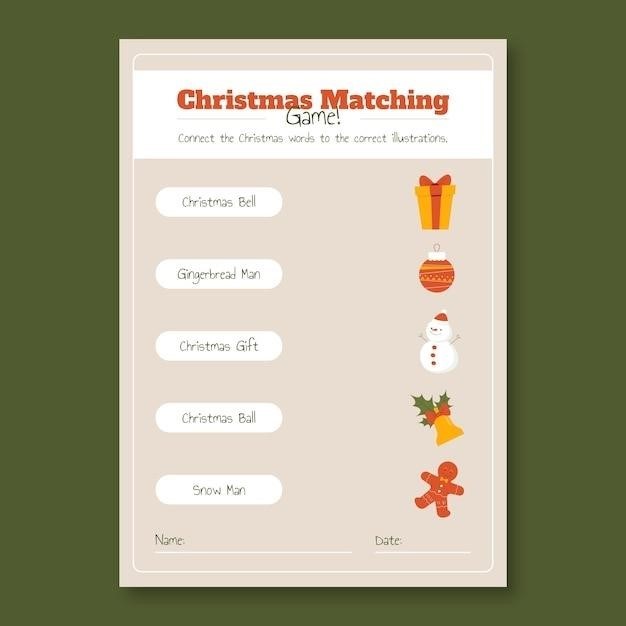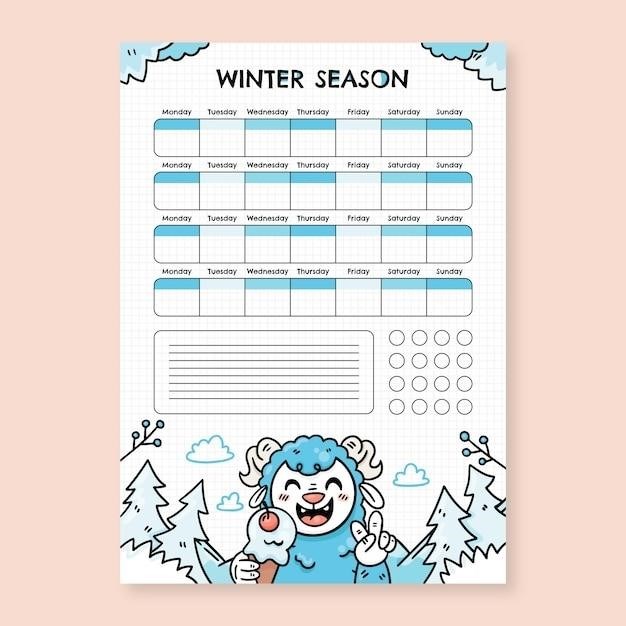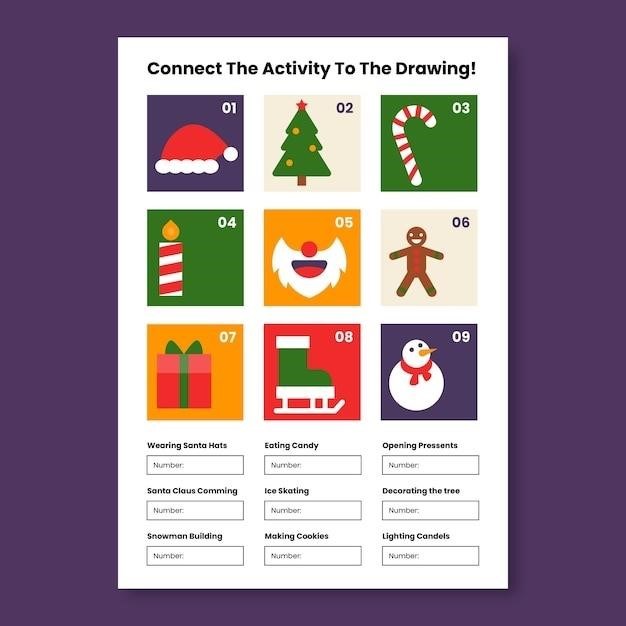
holidays and recovery worksheet pdf
Understanding Holiday Triggers and Relapse Prevention
The holiday season presents unique challenges for individuals in recovery. Identifying personal triggers‚ such as family gatherings or social events involving alcohol‚ is crucial. Developing proactive coping strategies for high-risk situations is essential for maintaining sobriety during this time.
Identifying Holiday-Related Triggers
The holiday season‚ while often joyous‚ can be fraught with potential triggers for relapse. For those in recovery‚ it’s vital to identify these specific stressors. Common triggers include family conflicts‚ intense emotions associated with memories or loss‚ the pressure of social gatherings centered around alcohol consumption‚ financial strain from holiday expenses‚ and the disruption of routine. Consider past holiday experiences and pinpoint situations or events that have previously led to cravings or risky behaviors. Be honest with yourself; acknowledging these triggers is the first step towards effective prevention. Write them down in your holiday recovery worksheet‚ noting the associated feelings and potential consequences. This detailed self-reflection is key to developing a personalized plan.
Remember‚ triggers can be subtle. The aroma of eggnog‚ certain songs‚ specific family dynamics‚ or even the sheer exhaustion of the season can all contribute to increased vulnerability. The worksheet helps you systematically identify these subtle cues‚ allowing you to develop personalized strategies to manage them. A proactive approach‚ supported by self-awareness‚ is crucial for navigating the potential pitfalls of the holiday season and safeguarding your recovery journey.
Developing Coping Strategies for High-Risk Situations
Once you’ve identified your holiday triggers using the worksheet‚ the next step is to create concrete coping mechanisms. For each trigger‚ brainstorm several strategies to manage the situation. This might involve planning alternative activities‚ such as attending a support group meeting or engaging in a relaxing hobby‚ to avoid high-risk environments. If attending a party is unavoidable‚ set a time limit for your presence and have an exit strategy prepared. Practice assertive communication techniques to manage potentially stressful interactions with family members.
Consider mindfulness techniques like deep breathing or meditation to manage overwhelming emotions. Lean on your support network – reach out to a sponsor‚ therapist‚ or trusted friend for guidance and encouragement; Pre-plan healthy coping mechanisms‚ like exercise or journaling‚ to alleviate stress and cravings. Pack a bag with healthy snacks to avoid impulsive decisions when hunger strikes. Remember to prioritize self-care; adequate sleep‚ healthy eating‚ and regular exercise are essential for maintaining emotional stability and reducing vulnerability to relapse. The holiday recovery worksheet provides space to detail these strategies‚ creating a personalized action plan to navigate challenging situations.

Creating a Personalized Holiday Recovery Plan
A well-structured plan is vital for navigating the holiday season successfully. This involves prioritizing self-care‚ building a supportive network‚ and utilizing readily available recovery resources. A personalized plan increases the chances of a relapse-free holiday.
Prioritizing Self-Care During the Holidays
The holiday season often brings increased stress and demands‚ making self-care even more critical for maintaining recovery. Prioritizing sufficient sleep is essential; aim for 7-8 hours nightly to support both physical and mental well-being. Nourishing your body with healthy foods and limiting excessive sugar and processed foods helps stabilize mood and energy levels. Regular exercise‚ even short walks or stretches‚ releases endorphins and reduces stress. Engage in relaxing activities like reading‚ listening to calming music‚ or taking warm baths to counter holiday pressures. Remember‚ self-care is not selfish; it’s a necessary component of successful recovery and a key to enjoying the holidays without jeopardizing your progress. Scheduling dedicated time for these activities‚ even just 15-30 minutes daily‚ can significantly improve your overall well-being during this busy time. Don’t underestimate the power of mindfulness and meditation practices to help manage stress and promote emotional regulation. These techniques can create a sense of calm and help you stay grounded amidst holiday chaos. Remember to be patient and kind to yourself; prioritize your well-being. If you find yourself struggling‚ don’t hesitate to reach out to your support network or therapist for guidance and support.
Building a Supportive Network
Cultivating a strong support system is vital during the holidays‚ a time when relapse risks can increase. Lean on trusted friends‚ family members‚ or recovery sponsors who understand your journey and can offer encouragement and accountability. Openly communicate your challenges and needs; don’t hesitate to ask for help if you’re feeling overwhelmed. Consider attending extra support group meetings or connecting with online recovery communities for added emotional support and shared experiences. These resources provide a safe space to express your feelings and learn coping strategies from others facing similar challenges. Actively participate in these groups‚ sharing your struggles and successes. Building a strong network extends beyond personal connections; consider professional support such as therapy or counseling. A therapist can offer personalized strategies for managing holiday stress and preventing relapse. Don’t isolate yourself; actively nurture your support network‚ and remember it’s okay to ask for help. The holidays can be a difficult time‚ but with a solid support system‚ you’re better equipped to navigate the challenges and maintain your recovery journey. Remember‚ you are not alone in this‚ and seeking support is a sign of strength‚ not weakness.

Utilizing Recovery Resources During the Festive Season
Access support groups and meetings‚ both in-person and online‚ for added strength and community during the challenging holiday season. Leverage technology—apps‚ websites—to connect with recovery resources and build a supportive network.
Accessing Support Groups and Meetings
The holiday season can be particularly challenging for those in recovery‚ often amplifying feelings of loneliness‚ stress‚ and temptation. Regular attendance at support groups and meetings provides a vital lifeline during this period. These gatherings offer a safe and supportive environment where individuals can share their experiences‚ learn from others‚ and receive encouragement. The structured format of many meetings‚ coupled with the shared experiences of fellow participants‚ can help manage cravings and prevent relapse. Connecting with a sponsor or mentor‚ often facilitated through these groups‚ provides additional personalized support. The sense of community and belonging fostered in these settings is invaluable in navigating the emotional complexities of the holidays. For those geographically isolated or facing scheduling conflicts‚ online support groups and virtual meetings offer accessible alternatives‚ maintaining crucial connections and fostering a sense of community.
Remember‚ seeking support is a sign of strength‚ not weakness. Don’t hesitate to reach out and actively participate. The shared experiences and collective strength within these groups can significantly improve your chances of successfully navigating the holiday season while maintaining your recovery.
Leveraging Technology for Recovery Support
In today’s digital age‚ technology offers a wealth of resources to aid recovery‚ particularly during the challenging holiday season. Numerous smartphone applications provide daily affirmations‚ relapse prevention strategies‚ and access to virtual support groups. These apps often incorporate features like progress trackers‚ mood monitoring tools‚ and even GPS locators to help avoid high-risk areas. Online forums and social media groups dedicated to recovery offer a sense of community and shared experience‚ providing immediate support when needed. Many recovery programs now offer telehealth options‚ allowing for virtual therapy sessions and consultations with counselors or sponsors‚ providing convenient access to professional support regardless of location or scheduling constraints. These technological tools can be incredibly helpful in managing cravings‚ tracking progress‚ and maintaining accountability during the emotionally demanding holiday period.
Remember to research apps and online resources carefully‚ ensuring they are reputable and align with your recovery goals. The convenience and accessibility of these technological aids can significantly contribute to a successful holiday season in recovery.